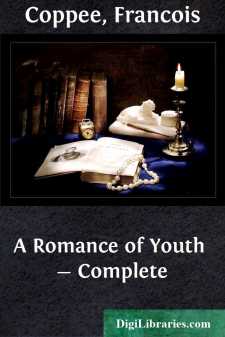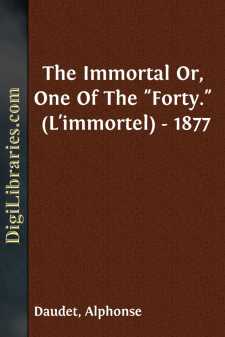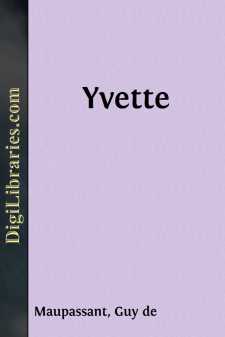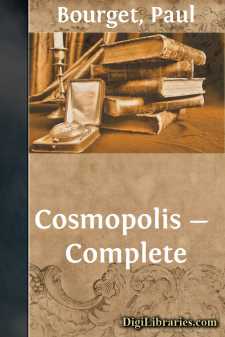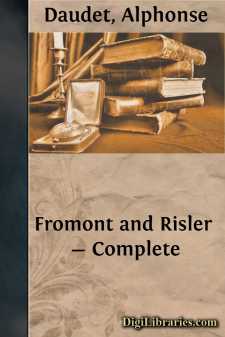Categories
- Antiques & Collectibles 13
- Architecture 36
- Art 48
- Bibles 22
- Biography & Autobiography 813
- Body, Mind & Spirit 142
- Business & Economics 28
- Children's Books 15
- Children's Fiction 12
- Computers 4
- Cooking 94
- Crafts & Hobbies 4
- Drama 346
- Education 46
- Family & Relationships 57
- Fiction 11829
- Games 19
- Gardening 17
- Health & Fitness 34
- History 1377
- House & Home 1
- Humor 147
- Juvenile Fiction 1873
- Juvenile Nonfiction 202
- Language Arts & Disciplines 88
- Law 16
- Literary Collections 686
- Literary Criticism 179
- Mathematics 13
- Medical 41
- Music 40
- Nature 179
- Non-Classifiable 1768
- Performing Arts 7
- Periodicals 1453
- Philosophy 64
- Photography 2
- Poetry 896
- Political Science 203
- Psychology 42
- Reference 154
- Religion 513
- Science 126
- Self-Help 84
- Social Science 81
- Sports & Recreation 34
- Study Aids 3
- Technology & Engineering 59
- Transportation 23
- Travel 463
- True Crime 29
Sort by:
by:
Francois Coppee
FRANCOIS COPPEE FRANCOIS EDOUARD JOACHIM COPPEE was born in Paris, January 12, 1842. His father was a minor 'employe' in the French War Office; and, as the family consisted of six the parents, three daughters, and a son (the subject of this essay)—the early years of the poet were not spent in great luxury. After the father's death, the young man himself entered the governmental office...
more...
CHAPTER I. A PARISIENNE'S "AT HOME" Despite a short frock, checked stockings, wide turned-over collar, and a loose sash around the waist of her blouse in other words, despite the childish fashion of a dress which seemed to denote that she was not more than thirteen or fourteen years of age, she seemed much older. An observer would have put her down as the oldest of the young girls who on...
more...
by:
Rene Bazin
CHAPTER I. THE ACCIDENT All I have to record of the first twenty-three years of my life is the enumeration of them. A simple bead-roll is enough; it represents their family likeness and family monotony. I lost my parents when I was very young. I can hardly recall their faces; and I should keep no memories of La Chatre, our home, had I not been brought up quite close to it. It was sold, however, and...
more...
by:
Alphonse Daudet
CHAPTER I. In the 1880 edition of Men of the Day, under the heading Astier-Réhu, may be read the following notice:— Astier, commonly called Astier-Réhu (Pierre Alexandre Léonard), Member of the Académie Française, was born in 1816 at Sauvagnat (Puy-de-Dôme). His parents belonged to the class of small farmers. He displayed from his earliest years a remarkable aptitude for the study of history....
more...
The Initiation of Saval As they were leaving the Cafe Riche, Jean de Servigny said to Leon Saval: "If you don't object, let us walk. The weather is too fine to take a cab." His friend answered: "I would like nothing better." Jean replied: "It is hardly eleven o'clock. We shall arrive much before midnight, so let us go slowly." A restless crowd was moving along the...
more...
by:
Emile Gaboriau
FIRST PART—FIRE AT VALPINSON These were the facts:—I.In the night from the 22nd to the 23rd of June, 1871, towards one o'clock in the morning, the Paris suburb of Sauveterre, the principal and most densely populated suburb of that pretty town, was startled by the furious gallop of a horse on its ill-paved streets. A number of peaceful citizens rushed to the windows. The dark night allowed...
more...
by:
Philippe Massa
MY DEAR FRIEND: I have often declared that I never would write prefaces! But how can one resist a fine fellow who brings one an attractive manuscript, signed with a name popular among all his friends, who asks of one, in the most engaging way, an opinion on the same—then a word, a simple word of introduction, like a signal to saddle? I have read your Zibeline, my dear friend, and this romance—your...
more...
by:
Paul Bourget
PAUL BOURGET Born in Amiens, September 2, 1852, Paul Bourget was a pupil at the Lycee Louis le Grand, and then followed a course at the Ecole des Hautes Etudes, intending to devote himself to Greek philology. He, however, soon gave up linguistics for poetry, literary criticism, and fiction. When yet a very young man, he became a contributor to various journals and reviews, among others to the...
more...
by:
Alphonse Daudet
ALPHONSE DAUDET Nominally Daudet, with the Goncourts and Zola, formed a trio representing Naturalism in fiction. He adopted the watchwords of that school, and by private friendship, no less than by a common profession of faith, was one of them. But the students of the future, while recognizing an obvious affinity between the other two, may be puzzled to find Daudet's name conjoined with theirs....
more...
Chapter 1 In my opinion, it is impossible to create characters until one has spent a long time in studying men, as it is impossible to speak a language until it has been seriously acquired. Not being old enough to invent, I content myself with narrating, and I beg the reader to assure himself of the truth of a story in which all the characters, with the exception of the heroine, are still alive....
more...


